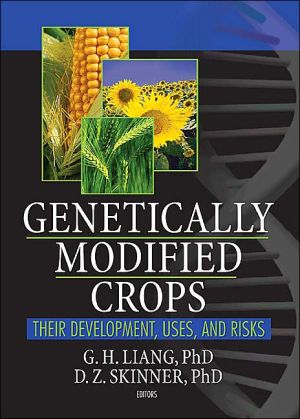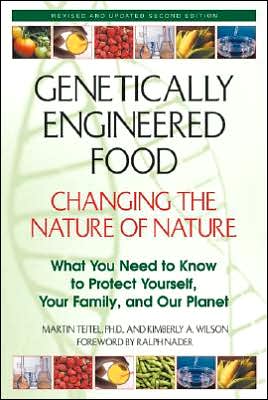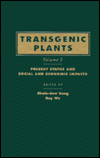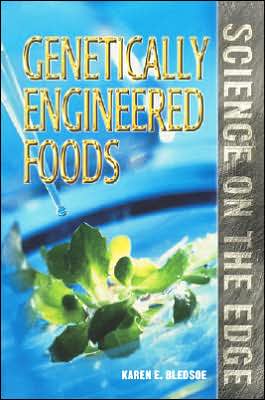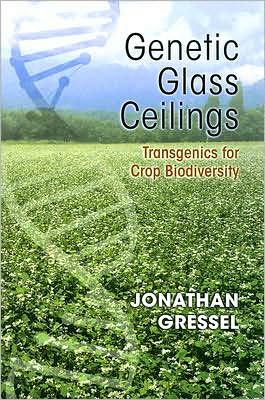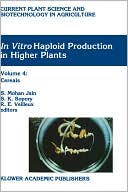Eat Your Genes: How Genetically Modified Food Is Entering Our Diet
This book gives us the facts about how genetically engineered food is entering our diet. It looks at what they are, how they are produced, why they remain unlabeled, and how they arrive on our plates unannounced. This edition includes a new introduction and is updated throughout.
Search in google:
Never before has Science been likely to have quite such a huge impact on our lives--after all, we are what we eat. Library Journal Nottingham, a crop protection biologist who has done research in both the United States and Britain, writes about the genetic engineering of foods for human consumption, not only fruits and vegetables but also crop plants such as corn and soybeans that enter our diet as ingredients in processed foods. He also notes that genetically modified meat, fish, and poultry will be on the market in the near future. As Nottingham points out, the introduction of genetically altered food could have serious consequences, e.g., allergic reactions and increased resistance to certain antibiotics. Ranging widely to cover the history, science, business, international relations, risks, ethics, and consumer issues of genetic engineering, Nottingham's book will serve as an informative primer for both general readers and students. It is clearly written in a report style that is supported throughout by up-to-date facts and figures from around the world. Another very readable book on this topic, although not nearly as detailed or broad in scope, is Robin Mather's more personal and conversational A Garden of Unearthly Delights (LJ 5/1/95). Recommended for public libraries and undergraduate collections in academic libraries.--William H. Wiese, Iowa State Univ. Lib., Ames
Introduction1A brief history of genetic improvement in agriculture12What is genetic engineering?113Milking it: Increasing yields and the pharming of proteins274Herbicide-resistant crops375Insect-resistant crops and a modified insect baculovirus476Designer food and engineered plants647Ecological risks808Risks to human health919Some ethical and moral issues9710The lucrative art of patenting10411Regulation of genetically modified organisms and food products12212Marketing approval for genetically modified food in Europe12913The consuming question of labelling14414Impacts on the Third World15615Prospects for genetically modified food172Abbreviations188Glossary190Biblography195Index203
\ From the Publisher\ Praise for the first edition:\ "...what brought Oprah Winfrey to a Texas court recently was controversy about mad cow disease and genetic engineering in the food supply. Nottingham offers a comprehensive look at these areas of growing concern."--Booklist\ \ \ \ \ \ Library JournalNottingham, a crop protection biologist who has done research in both the United States and Britain, writes about the genetic engineering of foods for human consumption, not only fruits and vegetables but also crop plants such as corn and soybeans that enter our diet as ingredients in processed foods. He also notes that genetically modified meat, fish, and poultry will be on the market in the near future. As Nottingham points out, the introduction of genetically altered food could have serious consequences, e.g., allergic reactions and increased resistance to certain antibiotics. Ranging widely to cover the history, science, business, international relations, risks, ethics, and consumer issues of genetic engineering, Nottingham's book will serve as an informative primer for both general readers and students. It is clearly written in a report style that is supported throughout by up-to-date facts and figures from around the world. Another very readable book on this topic, although not nearly as detailed or broad in scope, is Robin Mather's more personal and conversational A Garden of Unearthly Delights (LJ 5/1/95). Recommended for public libraries and undergraduate collections in academic libraries.--William H. Wiese, Iowa State Univ. Lib., Ames\ \ \ BooknewsBritish biologist Stephen Nottingham examines what genetically engineered food is, why it is produced, how it can remain unlabeled, how it is entering our diet, and who is responsible for producing and marketing genetically modified foods. Paper edition (unseen), $17.95. Annotation c. by Book News, Inc., Portland, Or.\ \

